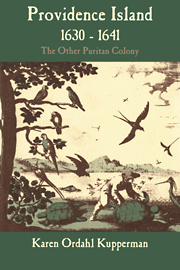Book contents
- Frontmatter
- Contents
- List of Maps
- Preface
- Author's Note
- 1 The Providence Island Company and Its Colony: The Program
- 2 Founding a Colony on Providence Island
- 3 Contested Authority: The Governorship of Captain Philip Bell
- 4 Frustrated Hopes for Economic Development
- 5 Land and Society: The Middling Planters
- 6 Servants into Slaves
- 7 Military Requirements and the People's Response
- 8 The Turbulent Religious Life of Providence Island
- 9 Governing Puritan Privateers: The Governorships of Robert Hunt and Nathaniel Butler
- 10 The Business History of the Providence Island Company
- 11 The End and Persistence of Providence Island
- Appendixes
- Bibliographical Essay
- Index
3 - Contested Authority: The Governorship of Captain Philip Bell
Published online by Cambridge University Press: 24 November 2009
- Frontmatter
- Contents
- List of Maps
- Preface
- Author's Note
- 1 The Providence Island Company and Its Colony: The Program
- 2 Founding a Colony on Providence Island
- 3 Contested Authority: The Governorship of Captain Philip Bell
- 4 Frustrated Hopes for Economic Development
- 5 Land and Society: The Middling Planters
- 6 Servants into Slaves
- 7 Military Requirements and the People's Response
- 8 The Turbulent Religious Life of Providence Island
- 9 Governing Puritan Privateers: The Governorships of Robert Hunt and Nathaniel Butler
- 10 The Business History of the Providence Island Company
- 11 The End and Persistence of Providence Island
- Appendixes
- Bibliographical Essay
- Index
Summary
THE GOVERNOR OF PROVIDENCE ISLAND was handed a job made impossible by the plantation's very design. Colonists and investors thought of the settlement as similar to a unit of local government in England, but the implications of such an assumption were not at all clear. The island was settled at a time when the relationship between central and local government was changing and developing in England, a process in which many of the investors, as county and national leaders, were deeply involved. Such change grew partly out of the widespread sense of crisis in England, which excited puritan leaders; it involved both consolidation of gentry control over local affairs and strengthening of their partnership with central government. Stuart local government rested on a web of loyalty, mutual obligation, and clientage. These networks were forged in small increments over time. They were fragile, resting on the ability of leaders to command respect in the county and in London and on the willingness of local men to give loyalty and support. No colony would succeed until it found a way to replicate these relationships or devised another web to take their place. Government would not function by mere fiat, particularly when separated by thousands of miles of water and several months from the locus of power in London.
Surprisingly little understanding of the nature of such relationships is reflected in the design of Providence Island's government. The adventurers were obsessed with the dismal failure of other colonial ventures, such as Bermuda and Virginia, to forge and sustain orderly, wellgoverned societies, and they traced such failure to the presence of divided councils in America and the shortsighted greed of merchants.
- Type
- Chapter
- Information
- Providence Island, 1630–1641The Other Puritan Colony, pp. 50 - 80Publisher: Cambridge University PressPrint publication year: 1993



